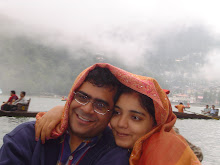
May seventh was the 147th birthday of Rabindranath Tagore, perhaps the most famous Bengali ever.
Tagore's poetry, prose and political writings earned him numerous awards, including the distinction of being Asia's first Nobel laureate, and he was a significant influence on the struggle for Indian independence. His role in the freedom struggle is often underestimated and misunderstood - most people over emphasize the role of Gandhi and underemphasize the role of everyone else, including Tagore.
One of the more interesting aspects of Tagore's contributions to the freedom struggle were his criticisms, especially his criticism of the concept of nationalism. Amartya Sen (another Bengali Nobel prize winner), in his recent book The Argumentative Indian has this to say about Tagore's critique of nationalism:
Rabindranath rebelled against the strongly nationalist form that the independence movement often took... He wanted to assert India's right to be independent without denying the importance of what India could learn - freely and profitably - from abroad. He was afraid that rejection of the West in favour of an indigenous India tradition... could easily turn into hostility to other influences from abroad, including Christianity, which came to parts of India by the fourth century, Judaism, which came through Jewish immigration shortly before the fall of Jerusalem, as did Zoroastrianism through Parsee immigration later on (mainly in the eighth century), and, of course - and most importantly - Islam, which has had a very strong presence in India since the eighth century.
Tagore's views are very prescient in considering the history of India and the rise of religious nationalism (see our post on Shamsul Islam's recent books). But they are perhaps even more prescient in light of another May birthday.
On the 15th of May of 1948, the British occupation of Palestine ended with a handover of power to a branch of European zionists, thereby creating the state of Israel. In the process, tens of thousands of Palestinian families were displaced. While the anti colonial sentiment and resistance to the British is to be applauded, the supposed justification for this situation (the terrible crimes committed by the Nazis against Jews, Roma, homosexuals and others) does not justify the "catastrophe" or "Nakba" as this displacement is known to Palestinians. The real reason for the creation of Israel lies in the continuation of a kind of colonialism, one that is evident whenever we consider the double standards applied to Israel on issues of nuclear proliferation, rule of law, and human rights. All nationalism has its ugly side, but the current celebrations of Israeli independence are perhaps a display of nationalism at its ugliest.
Here's a short youtube clip from Edward Said on apartheid within Israel (more of him here). More info can be found here, and a really good timeline of events can be found here.

No comments:
Post a Comment